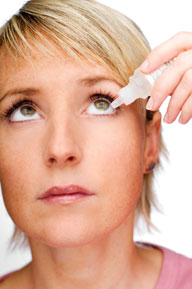Allergies: A Look at Preventing, Living With Eye Problems

In eye allergies, also called "allergic conjunctivitis," exposure to allergens like dust mites, pet dander, pollen and mold inflame the tissue that lines the inside of the eyelid. Symptoms include burning, itchiness, tearing, swelling and a gritty sensation. Some patients report blurred vision and fatigue. Eyes can become so painful and irritated that they disrupt everyday life.
What's the best way to avoid eye allergies? Avoid eye allergens. Of course, it's impossible to completely avoid allergens like dust. For this reason, most people turn to over-the-counter or prescription medications.
Eye allergies can be especially challenging for Americans who wear contact lenses. Some people will simply avoid wearing contacts during allergy season. Others opt for allergy-friendly lenses, like daily disposables. In particular, one-day contact lenses avoid build-up and eliminate exposure to irritating cleaning and disinfecting solutions.
The American Optometric Association offers the following tips for Americans living with eye allergies:
- Don't touch or rub your eyes. Rubbing your eyes can damage tissue. Also, if you have anything on your hands, you risk getting it in your eyes.
- Wash your hands often with soap and water. If you do happen to touch your eyes with your hands, it is safer if your hands are clean.
- Wash your bed linens and pillowcases often. At least once a week, wash your sheets and pillowcases in hot water and detergent. The hot water will help remove airborne allergens that have fallen on you sheets and will kill dust mites.
- Avoid wearing eye makeup. Cosmetics can cause eye allergy symptoms or further irritate eyes that are already experiencing an allergic reaction.
- Don't share eye makeup. You can easily transfer infectious bacteria through shared makeup tools.
You do not have to tolerate itchy, watery eyes. If you suffer from eye allergies, see your optometrist about possible treatment options. Please visit www.aoa.org to find an optometrist in your area.






No comments: